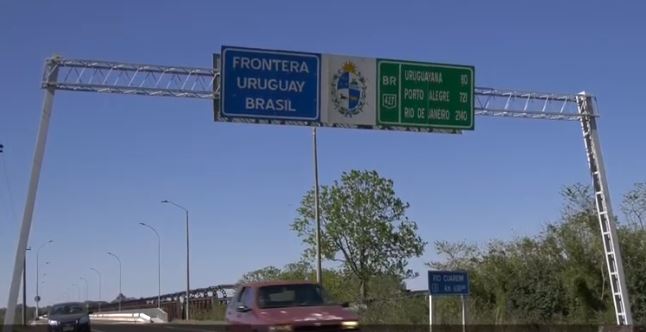-
13 February 2020
Category : Opinion
Strengthening cross-border governance: Peace border
Bárbara Gómez, a democratic governance agent of the EUROsociAL+ programme gives us her vision on the border situation at the Uruguay river basin, shared by Brazil, Uruguay and Argentina, and EUROsociAL+ efforts to promote good governance at the borders.
 EUROsociAL+ promotes good governance at the borders.
EUROsociAL+ promotes good governance at the borders.We are in the southernmost triple border of America… between Barra de Quaraí (Brazil), Bella Unión (Uruguay) and Monte Caseros (Argentina). This border’s lands share, among many other things, the trinational basin of the Uruguay River, which, throughout its course, involves the territories of Uruguay (mainly coastal departments, but not only these); the coasts of the provinces of Entre Ríos, Corrientes and Misiones of Argentina, and half of the area of the states of Rio Grande do Sul and Santa Catarina of Brazil.
In these moments of migratory upheaval, it is becoming increasingly necessary to encourage dialogue between those communities that share territory and many times the same needs, but are in different countries. To promote spaces of good cross-border governance and, therefore, “Peace Border” spaces.
People who live in the tri-national basin of the Uruguay River have a shared identity that feeds on itself every day, generating a spirit of constant coexistence. The entire area is characterised by a relatively homogeneous population concentrated in a small number of urban centres. Quality of life indicators are relatively high compared to other areas of Latin America. Nevertheless, they also share problems that recur throughout the basin. On numerous occasions, people from the same family live in different municipalities belonging to different countries. Solutions to everyday problems are difficult when these people face bureaucratic hurdles where the laws between the three countries are not homogenised/mutually recognised Or, for example, living on one side of the border and working on another often causes situations of inequality due to incompatibility of the currency and its value, among other things. The same applies to language in the case of Brazil, which, from a positive perspective, also brings cultural enrichment.
All this evolution of circumstances with which the citizens of the border live requires special attention from the governance of public policies charged with meeting the needs of a particularly idiosyncratic population. Helping to strengthen the interrelationship between public authorities at different levels, as well as with external relations between countries, is a major effort, but at the same time a fascinating challenge that brings us back to territorial cohesion framework.
The workshop on Challenges for the sustainable development of the Trinational Basin of the Uruguay River was an opportunity to start a joint reflection on how to generate comprehensive policies for better integration and impact on the processes, generating better opportunities for the development and social cohesion of shared territories. Stakeholders from nations, as well as sub-national and local authorities, civil society representatives and bi-national organisations, all participated in this activity at the end of September 2019, which allowed different representatives from the three countries involved to sit at the table with a multilevel perspective. All of this is based on the logic of establishing a roadmap for improving governance, understood as the effective implementation of social inclusion mechanisms and the improvement of the perception that citizens have of themselves (according to the ECLAC definition). To achieve this, the aim was to establish tasks and responsibilities to develop strategies and policies to build trust and strengthen social cohesion, facing the asymmetries generated by the peripheral and border condition of the territory. In this case, the roadmap opted to establish mechanisms for a more effective linkage of local entities with existing structures and strategies for the basin’s management[1].
It is important to note that the Uruguay River is not only the territory’s main economic development vector, but also the backbone of the cultural, educational, environmental and social dimension of this stretch of the basin, in which there are prior links and ties that require greater planning and cooperation between stakeholders.
From the + EUROsociAL programme we have been accompanying the Uruguay Mayors Congress, which is leading the initiative, in the development and strengthening of integration strategies in the territories of the cross-border basins of the Uruguay River and Merin Lagoon to channel the development possibilities of the cross-border areas with a watershed approach, strengthening governance and empowering local and subnational governments. Likewise, the Committee for the Development of the Uruguay River Basin (CCRU), has been established as a strategic coordination space for the subnational and local governments of this region shared by Argentina, Uruguay and Brazil. This workshop is one of the activities that will contribute to the achievement of improved governance result in these border areas. The European experiences presented will also help to visualise successful processes of equal importance, and inspire dialogue between regions where geography does not distinguish between nationalities. In the words of Trías (1985), “Reality becomes denser in limits.”
Bárbara Gómez Valcárcel. Democratic Governance Technician. EUROsociAL +
[1] Roadmap prepared by Jose María Cruz, AEBR (Association of European Border Regions) in collaboration with experts: Marcos Pedro Follonier and Hamilton Santos Rodríguez commissioned by the EUROsociAL + Programme
The views and opinions expressed in this blog are the sole responsibility of the person who write them.






